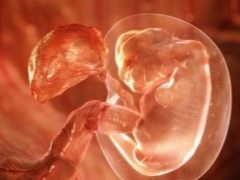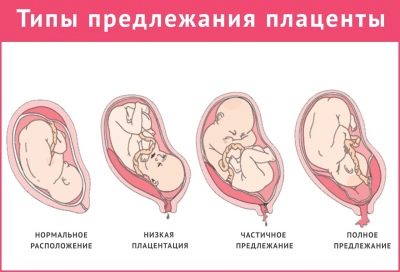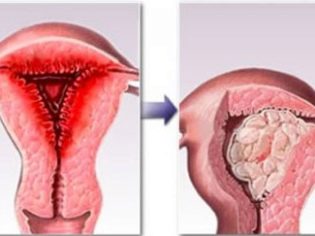Signs and features of embryo implantation
For the onset of pregnancy, one conception is not enough, it is also necessary that the fertilized egg could gain a foothold in the uterus and begin to develop. This process is called implantation. In this article we will describe how implantation takes place, when it happens, why an egg cannot implant, according to what signs a woman can guess that implantation has occurred.
What it is
After the female ovum meets with the sperm, an intensive process of transformation of the oocyte into a zygote begins. After the merger of 23 female and the same number of male sex chromosomes, a full-fledged zygote cell is obtained that contains 23 chromosomes - all information about the future baby, including his gender, height, hair color, eye, possible talents and hereditary diseases. The zygote is constantly broken up and sent towards the uterus.
From the fallopian tube, where the process of fertilization takes place, to the uterus, it has to move for several days. All this time, the fertilized egg grows, gradually turning into a blastocyst. At 7-8 days after ovulation, the embryo enters the uterus, where its fate should be decided. If the implantation of the embryo in the wall of the uterus occurs, pregnancy will come. If this does not happen, the woman will begin regular periods of time almost on time, and she may never know that she was just one step away from pregnancy.
After conception, two shells form in the zygote - the outer and the inner. It is the external one — the trophoblast — that is responsible for the attachment of the ovum. The implantation period lasts up to 40 hours during a natural pregnancy and up to several days during IVF. That is how long it takes to complete a complex process consisting of two stages, completed completely.
The first stage is adhesion. The fetus is attached to the wall of the uterus, sticks to it. The second stage is invasion. At this stage, the trophoblast cells are transformed into thin villi, which begin to infiltrate into the endometrium of the uterus, to “dig in” into it. Villi produce special enzymes that dissolve endometrial cells. It turns out "cozy nest", in which the fertilized egg goes deep. Now that it is firmly fixed, the trophoblast villi continue to move deep into the tissues of the uterus. It is they who form the chorion - the prototype of the placenta, and from that moment on them lies the crucial task - feeding the embryo with nutrients and oxygen from the mother's blood.
Implantation of a particular woman may be late or early. Early is called the attachment of the ovum during the week after ovulation. If this fateful process is delayed and occurs only after 10 days from the moment of ovulation, then the implantation is called late.
Both those and other terms are an absolute norm. But still, there are certain prerequisites for late implantation. Thus, some pathologies of the fallopian tubes - for example, the narrowing of their lumen - can “delay” the zygote in transit for 2-3 days. With a delay in the uterus and embryos are descended, which have anomalies of cell division. But not late implantation is dangerous, but early.
If the ovum has fallen into the uterus before the endometrium under the action of hormones becomes loose enough, then the implantation may not occur or the pregnancy will occur,but will be accompanied by risks of interruption, placental insufficiency in the future.
Due to the action of progesterone after ovulation, so-called pinopodia on the endometrium is formed in the woman's body - cellular “protrusions”, which significantly facilitate the implantation task. It takes time to form them; if the fertilized egg cleaves to the uterus wall earlier, then the implantation may not occur again and the embryo will die. If the implantation is late, then there is a risk that pinopodia will already “dissolve” and then the attachment may fail again. There are particular structures of the endometrium in just 24-48 hours.
After the embryo has been attached, if everything went well, the production of chorionic gonadotropin begins - the very same hCG hormone, which is so important for the diagnosis of pregnancy. But it is possible to detect it only after about a week, as its concentration increases gradually.
Special features
Implantation is a rather individual process, in which much depends on the age of the woman, the state of her endometrium, the hormonal background and the general state of health. There are some peculiarities in the attachment of the embryo after natural conception and in the cycle of in vitro fertilization. Let's talk about this in more detail.
After natural conception
Influence the processes after the natural conception of a woman can not. She doesn’t even know if the conception took place on the day of ovulation. The hormonal background also remains a mystery, but practically none of fertile and healthy women think about it. Implantation after natural conception takes less time: both during the first and the third or fourth pregnancy, it will proceed approximately equally.
The more women had pregnancies and childbirth, the thinner the functional layer of her endometrium, and therefore low attachment of the ovum, which then can lead to placenta previa, is not excluded. It can be diagnosed only for a period of 12-14 weeks of pregnancy.
In the IVF treatment cycle
Fertilization in IVF does not occur in the fallopian tube, but in vitro under the strict supervision of an embryologist doctor. Oocytes, whose growth and maturation are stimulated by hormonal preparations, are taken by puncture and fertilized with the nutrient medium by the spermatozoa of the husband or donor. For several days, doctors monitor how many eggs have fertilized, assess their quality. And then the date of embryo transfer to the uterus is set.
Three-day or five-day embryos enter the uterus through a thin catheter inserted by the doctor into the cervical canal of the cervix. But wait for early implantation is not necessary. For several days they can freely swim in the uterine cavity, the benefit of food at this stage they take from the environment.
Implantation after in vitro fertilization lasts not 40 hours, but longer. Usually, the probability of attachment is said only from 3-4 days after the embryo is transferred into the uterus. After cryo-transfer, the process may take even longer. Embryos in the cryoprotocol and three-day embryos are implanted longer. In 5-day-old embryos, adaptive abilities are higher. They can begin to attach to the wall of the uterus within a few hours after transfer. The probability of successful attachment of three-day embryos is estimated at about 40%, and the probability of implantation of five-day embryos is about 50%. Two-day or six-day embryos take root much worse.
The process of implantation itself takes place in the same way as natural conception. In the IVF cycle, the thickness of the endometrium is very important. If it is less than 7 mm or more than 14 mm, then the chances of a successful implantation, alas, are low. The required thickness is “increased” artificially with the use of hormonal preparations and must be controlled with the help of ultrasound diagnostics.
Signs and symptoms
If you ask the doctor whether it is possible to feel the moment of embryo implantation, he is unlikely to be able to answer with any confidence anything intelligible. Official medical sources do not describe a single reliable sign of implantation. But many women are sure of the opposite and claim that they have quite clearly felt the changes in their state and well-being. From the point of view of medicine, this is possible, because already at the stage of invasion (immersion of the ovum in the endometrium) in the body of the fair sex hormonal changes begin, and it is their consequences that a woman can theoretically feel.
In theory, this means that not every lady will notice unusual sensations, much depends on individual sensitivity. During the second or third pregnancy, the chances of feeling at least something are higher than at the first, when a woman does not identify any minor changes in well-being with pregnancy due to the lack of relevant experience.
So, what kind of sensations can be accompanied by implantation:
- slight discomfort in the lower abdomen (the stomach can "pull", as before menstruation, but slightly weaker);
- body temperature rises to subfebrile values (37.0-37.5 degrees);
- feeling of mild nausea, headaches, severe weakness, chills (while women in most cases sincerely believe that they have caught a cold);
- increased drowsiness, fatigue, slight irritability, anxiety;
- the appearance of a peculiar taste in the mouth, which women compare with the taste of a metal coin.
Especially it is necessary to dwell on such a sign as the appearance of a small bleeding from the genital tract. This is the so-called implant bleeding. We already know that invasion of the ovum is associated with the destruction of endometrial cells. The integrity of the small vessels is broken - the capillaries, the released blood must leave the female body. And most often she does it in a natural way - through the vagina.
Implantation discharge sometimes puzzles a woman, because there is still about a week before the expected monthly date. But many treat them calmly and believe that menstruation just started early, for a variety of reasons (stress, quarrel, illness, fatigue, etc.). But it is not monthly. Bleeding stops during the day - a maximum of two. And no more unusual discharge is observed.
Implant bleeding is not dangerous for either the mother or the fetus, it does not affect the subsequent course of pregnancy. It is not observed at all, which is also completely normal. The mechanism of its appearance or absence is not fully understood.
The basal temperature after the implantation takes place rises and remains at a fairly high level. This is due to the increased concentration of progesterone, which ensures the development of pregnancy. Typically, the temperature after attachment of the embryo is set at 37.0-37.5 degrees. A higher basal temperature is a sign of inflammation rather than pregnancy. Low temperature indicates insufficient progesterone levels. Even if the implantation was successful, the pregnancy can be interrupted at any time because of this hormonal factor.
A woman can feel special sensations in the breast during the onset of pregnancy only a few days after implantation, when the level of human chorionic gonadotropin becomes high enough.
The cervix after implantation may slightly change its color from pink to bluish, which is due to the increased blood supply to the female reproductive organ.
A gynecologist after a week can determine some softening of the cervix, cervical mucus under the action of progesterone becomes thick and forms the very mucus plug, the discharge of which will be a signal of the onset of labor.
Why is attachment not occurring?
Women who are planning a pregnancy for a long time and so far without success, should definitely visit a doctor to find out at what stage there is a problem - there is no conception or implantation. Very often, the problem of infertility lies precisely in the absence of the ability of the ovum to implant and consolidate on the wall of the uterus.
Unsuccessful implantation may be due to:
- hormonal disorders (insufficient levels of female sex hormones, due to which ripening and growth of the endometrium to the required 7-14 mm does not occur);
- a violation of the immune status of a woman (when her own immunity perceives the embryo as a foreign object and seeks to destroy it);
- non-viability of the embryo (spontaneous genetic errors occurred during conception, fertilization occurred immediately with two spermatozoa, the egg contained an incomplete set of chromosomes, development slowed down);
- endometrial pathologies (thinning of the functional layer after several abortions, surgical curettage, inflammatory process, for example, endometriosis);
- tumors in the uterus (endometrium in any tumor process is deformed, which can interfere with the attachment and development of the embryo).
The reasons may lie in the overweight woman, because it affects the level of her sex hormones, and in bad habits - smoking, alcohol intake, as vascular changes occur that prevent the stage of invasion. They affect the process of the introduction of the ovum and the preparations that the woman takes - antibiotics and antispasmodics.
Is it possible to increase the chances of success?
After conception, which occurred in a completely natural way, a woman cannot have a special influence on the further processes involved in the attachment of a blastocyst. The only thing she should do if she suspects the likelihood of pregnancy is give up alcohol and nicotine, beware of viral and colds. She can have sex, it does not affect the implantation process, if the conception was natural.
After embryo transfer in the IVF treatment cycle, the requirements for the patient are completely different. She can not have sex, because orgasm and sexual arousal increase the likelihood of increased uterine tone, which will significantly reduce the chances of successful introduction of the embryo into the endometrium. A woman is recommended bed rest in the first days after the transfer, and then a moderate, gentle motor mode.
It is necessary to take the prescribed hormonal preparations of support, as well as vitamins and vascular drugs, if the doctor insists on them, for example, “Actovegin».
It is possible to judge the success of implantation only 14 days after embryo transfer during IVF or from the first day of delay of the next menstruation. At this time, a blood test for hCG will accurately show the presence or absence of pregnancy.
The chances of successful implantation are higher, a woman needs to take care even before conception - to lose weight (losing weight even by 5% of body weight increases the likelihood of pregnancy by 45%), exclude coffee and strong tea from the diet, eat properly and balanced , take vitamins and folic acid, do not abuse douching and various medications, be examined for genital infections, inflammation in the uterus and genital tract.
After IVF, women are recommended a protein diet for at least 10 days, as well as the elimination of stressful situations.
Reviews
Many women in their responses to the thematic forums claim that they did not feel any signs of implantation and learned about pregnancy only with the onset of menstruation. More carefully listen to their bodies ladies who have passed the IVF protocol - for them, the pregnancy is desired and long-awaited.They claim that there were signs in a successful protocol, but it is very easy to confuse them with the side effects of hormonal drugs that must be taken during and after the entire protocol if the pregnancy has occurred.
The most unusual sign, which medicine cannot explain, women call the mood that has changed after implantation. The lady becomes incredibly sentimental, tearful, can spend hours touching the cats and children in the photo, she begins to dream vivid dreams.
For embryo implantation: terms, conditions and signs, see the next video.

































